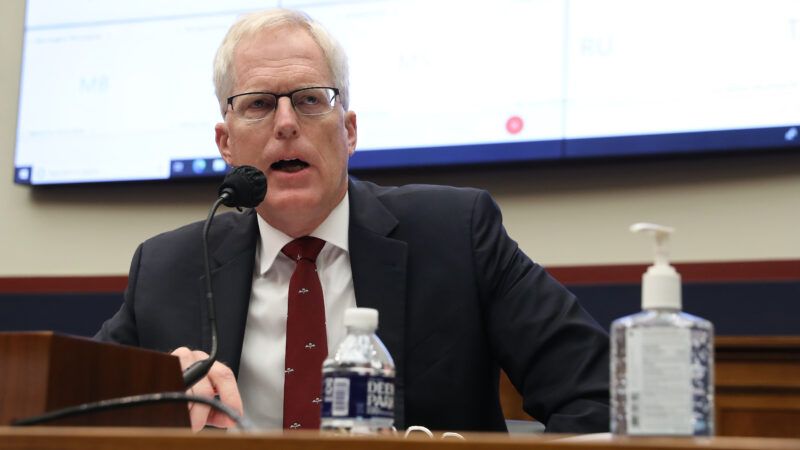Mandatory National Military Service Is a Bad Idea
Donald Trump's acting Secretary of Defense Christopher Miller advocated the plan this week, which Trump later called a "ridiculous idea."

In December, the Department of Defense revealed that it had missed its collective recruitment goals for the armed forces by 41,000; among the separate military branches, only the Navy and Space Force met their individual goals.
Given that, according to FiveThirtyEight, President Joe Biden and former President Donald Trump are running nearly dead even in their respective bids for a second term, either man is as likely as the other to be called upon to address that shortfall.
One former Trump Cabinet secretary is pushing national mandatory military service. If elected, Trump would do well to reject the idea.
Christopher Miller served as Trump's acting Secretary of Defense for roughly two months, between the 2020 election and Biden's inauguration. In a December 2023 interview with Hugh Hewitt about Cabinet appointments in his potential second term, Trump said that Miller "did a very good job" and could potentially be reappointed.
Miller told The Washington Post that a national mandate on military service should be "strongly considered," adding, "Why wouldn't we give that a try?"
The Post also quotes other Republicans in support of the idea, including Sen. J.D. Vance (R–Ohio), a potential Trump running mate, who advocates some form of "skin in the game," potentially through mandatory service.
After the Post story was published, Trump pushed back, calling it a "ridiculous idea" in a post on Truth Social. "The Story is completely untrue," Trump wrote. "In fact, I never even thought of that idea."
Good. Because mandatory national military service is inherently antithetical to American liberties, and Miller is wrong to propose it.
To answer Miller's question most directly, the idea of mandatory service inherently contradicts the idea of a "volunteer" military, which the U.S. has had since it abolished the draft in 1973.
But more broadly, the idea "undermines one of the fundamental principles of a free society: that people own themselves and their labor," writes Ilya Somin, a law professor at George Mason University. "We are not the property of the government, of a majority of the population, or of some employer. Mandatory national service is a frontal attack on that principle, because it is a form of forced labor—literally so."
Indeed, we would rightly condemn any effort to force most Americans to spend a hurricane season deployed with the Federal Emergency Management Agency (FEMA) or to serve a stint at the IRS processing tax returns. So why, then, should we be okay with a forcible tour of duty?
Advocates say that mandatory service would create a sense of national unity; Miller told the Post that military service "reinforces the bonds of civility." At the 2012 Aspen Ideas Festival, Gen. Stanley McChrystal advocated a national service program beginning at the end of high school or college, "because once you have contributed to something, you have a slightly different view of it. And I think that it would be good to have a shared experience." (McChrystal was talking about more than just military service, though he did also advocate bringing back the draft.)
But unity is not a sufficient reason to press people into service. "We could achieve even greater national unity by suppressing dissenting speech and religion," writes Somin. "Yet we rightly recognize that unity is not a valid justification for violating these fundamental human rights. The same goes for the right to be free of forced labor. A unity achieved through coercion is not worth the price."
The idea is fortunately not popular among peer nations. "The 60 or so countries that still require armed servitude to the state are largely impoverished authoritarians like Cuba, Turkmenistan, and Iran," Reason's Matt Welch wrote in 2022. "Of the richer world exceptions, most live in a state of real or perceived existential threat on their borders—Israel, Estonia, Taiwan, Singapore, and South Korea." Thankfully, neither of those scenarios describes us.
It's worth remembering psychologist Abraham Maslow's famous axiom that "it is tempting, if the only tool you have is a hammer, to treat everything as if it were a nail." When McChrystal advocated a form of national service, he prefaced it by observing that "we've never done an extended war with a professional army like this"—referencing the War in Afghanistan, which had lasted for a decade already and would not end for nearly a decade more.
McChrystal noted that while the U.S.'s all-volunteer army "performs magnificently…we're running it very, very hard, and at a certain point you just can't expect it to go forever." Perhaps that's a good thing: If fewer people are available to fight the nation's wars, then maybe lawmakers will be less inclined to start them.


Show Comments (92)